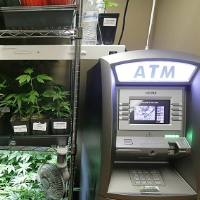Banks Still Won't Touch Medical Marijuana Dispensaries

When President Barack Obama and Attorney General Eric Holder, a couple years ago, assured medical marijuana dispensary owners in states where their business was legal that they wouldn’t get busted, they thought they could take that pledge, as the saying goes, to the bank.
But as subsequent numerous arrests and prosecutions attest, those promises could not be taken to the bank and neither could money used in running the businesses. Holder said in an interview last week that the federal government will revisit regulations that make it way too dangerous for banks to accept deposits or make loans tied to medical marijuana because of fear they will be prosecuted.
“You don't want just huge amounts of cash in these places,” Holder said. “They want to be able to use the banking system. And so we will be issuing some regulations I think very soon to deal with that issue.”
That would be a far cry from federal policy in 2011, when regulators ordered banks in Northern California to spy on the transactions of customers suspected of involvement in the legal state medical marijuana industry. The policy came to light when Savings Bank of Mendocino County told shareholders the federal government had designated the North Coast as a high-risk area for money laundering and it was being compelled to cooperate.
The bank said it had already been cooperating with the authorities for a year, but that it was ordered to be more diligent. One dispensary owner in Ukiah told the Santa Rosa Press Democrat at the time that he had been dumped by two banks and that other owners were working with banks on a “don’t ask, don’t tell” basis.
That got harder to do after the U.S. Attorneys offices in California became more aggressive about marijuana prosecutions later in 2011, even as the burgeoning industry was putting piles of cash in the hands of shop owners and growers. Around 20 states allow medical marijuana sales in some fashion and two states, Colorado and Washington, legalized pot for general consumption last year.
The Federal Deposit Insurance Corporation (FDIC) requires financial institutions, under the Bank Secrecy Act, to monitor any suspicious money laundering activity. At least one Mendocino County lender, Exchange Bank, said it curtailed business with dispensaries because the cost of monitoring transactions was too high.
While federal law criminalizes possession and sale of pot, California legalized medical marijuana in 1996 and authorized nonprofit cooperatives as dispensaries in 2004. No reconciliation of state and federal policies appears near as courts, legislatures and chief executives give conflicting government signals to the public.
As a result of the banking restrictions, dispensary owners with piles of cash are robbery targets stuck with very inefficient ways to run a business. Paying employees and bills, making purchases and safely storing their loot are problematic.
There is no guarantee that the new regulations promised by Holder will benefit California. The attorney general was vague about whether new rules would only apply to states that had more broadly legalized marijuana than for just medical purposes. And Obama was no more forthcoming in an interview with New Yorker editor David Remnick.
The president said he doesn’t like marijuana, which he thinks is a “bad habit and a vice,” “a waste of time” and “not very healthy.” That said, he doesn’t think it is any worse than alcohol and is concerned that far more poor black and Latino kids get busted for pot than middle-class white kids.
–Ken Broder
To Learn More:
Banks Fear Punishment if Tied to Pot Dispensaries (by David Hood, Orange County Register)
Feds Seek to Legalize Marijuana Industry Banking (by Pete Yost, Associated Press)
U.S. to Adjust Rules to Let Banks Handle Marijuana Money—Holder (by David Ingram, Reuters)
Obama Intensifies War against Marijuana . . . The Matthew Davies Case (by Noel Brinkerhoff and Ken Broder, AllGov California)
- Top Stories
- Controversies
- Where is the Money Going?
- California and the Nation
- Appointments and Resignations
- Unusual News
- Latest News
- California Forbids U.S. Immigration Agents from Pretending to be Police
- California Lawmakers Urged to Strip “Self-Dealing” Tax Board of Its Duties
- Big Oil’s Grip on California
- Santa Cruz Police See Homeland Security Betrayal in Use of Gang Roundup as Cover for Immigration Raid
- Oil Companies Face Deadline to Stop Polluting California Groundwater





